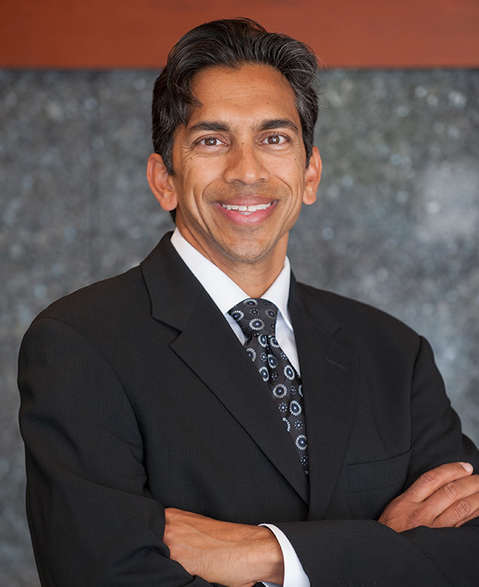
Medically Reviewed by Max Parikh, M.D. NVISION Surgeon
Is There an Age Limit for Cataract Surgery?
Home / Guide to Cataract Surgery /
Last Updated:

Medically Reviewed by Max Parikh, M.D. NVISION Surgeon
Cataract surgery is safe for all ages. There is no age limit on when you can get the surgery.
Table of Contents
The best time to get your cataracts fixed is when they start to interfere with your everyday life, making it hard for you to see well enough to read or drive.
You can get cataract surgery at any age, but in elderly adults, there are some additional circumstances to consider, such as underlying medical conditions, deteriorating tissue, and a potentially longer healing time.
Cataracts that are diagnosed at birth or develop in early childhood are rare special cases and are more complex to manage. They are not further discussed here.
Cataract surgery can greatly improve your quality of life. Talk to your doctor about the safety and benefits of cataract surgery for you.
Average Age for Cataracts

Cataracts typically start to form in your 40s or 50s, but they often do not really start to impact your vision until after age 60. In the early stages, you can manage cataracts by changing your eyeglass prescription, keeping lights brighter, and using anti-glare sunglasses.
Cataracts at Certain Ages
As we age, the likelihood of developing cataracts and the impact they have on our vision tend to increase. The following table outlines the typical progression and impact of cataracts across different age groups:
You deserve clear vision. We can help.
With 135+ locations and over 2.5 million procedures performed, our board-certified eye surgeons deliver results you can trust.
Your journey to better vision starts here.
| Age Group | Typical Cataract Impact |
|---|---|
| Cataracts at 40s | Cataracts may begin to form, but they’re usually too small to affect vision. Regular eye exams are important to monitor any potential developments. |
| Cataracts at 50s | Cataracts might start to have a small impact on vision, such as requiring more light to read. Some people may begin noticing minor vision issues like glare or halos around lights at night. |
| Cataracts at 60s | This is the age when cataracts often start to impact vision more noticeably. Symptoms could include blurred vision, difficulty seeing at night, or colors appearing less vibrant. This is often the age when cataract surgery begins to be considered. |
| Cataracts at 70s | Cataracts are likely to significantly affect vision, making daily tasks such as reading or driving difficult. Many people in this age group opt for cataract surgery. |
The Ideal Time for Cataract Surgery
There is no universal, perfect time to have cataract surgery. According to the National Eye Institute, the decision to have surgery is personal, and you should make that decision in consultation with a doctor you trust. In general, it is reasonable to consider surgery when your inability to see clearly keeps you from everyday activities, such as reading, driving or watching television. If the lifestyle steps you have tried are not enough to make these daily tasks easier, surgery might be the best way to get you back to the life you once had.
The American Academy of Ophthalmology reports that an inability to drive safely at night could indicate that it’s the right time for surgery. Cataracts can cause glare and halos around the lights from oncoming cars, and that can make nighttime driving unsafe. If cataracts grow yet more advanced, you may fail the vision test required to renew your driver’s license. Cataract surgery is then necessary to keep your driving privileges.
While you may be tempted to avoid surgery as long as you possibly can, there may be a point at which your cataracts grow severe enough to put your safety at risk. For example, Harvard Health Publishing reports that advanced cataracts can make seeing stairs difficult, and that could lead to severe falls. Surgical complications do increase if cataracts are allowed to mature to the “ripe” stage, so it is advisable to take care of them well before that.
A frank talk with your doctor about the symptoms you are experiencing and the difficulties you are facing can help you understand if now is the right time to schedule the surgery you are considering.
The Safety of Cataract Surgery for the Elderly
Surgical procedures can be riskier in older adults, especially people over the age of 65. But this is not true for cataract surgery.
In essence, there is no such thing as being “too old” for a cataract surgery. The procedure is regularly done successfully on patients in their 80s and 90s.
There are many reasons that cataract surgery is considered safe for older adults.
- Cataract surgery is a same-day and minimally invasive procedure.
- Local anesthesia (typically in the form of eye drops) is used, so general anesthesia is not necessary.
- The eye and ocular system are closed off from the rest of the body, so many health problems impacting other parts of your system will not influence cataract surgery.
- Medications like anticoagulants usually do not have to be stopped prior to cataract surgery.
Today, people are living for decades past age 65. Cataract surgery can improve vision and enhance overall quality of life for many years, even when the surgery is done later in life.
You deserve clear vision. We can help.
With 135+ locations and over 2.5 million procedures performed, our board-certified eye surgeons deliver results you can trust.
Your journey to better vision starts here.
Considerations for Surgery in Older Adults
While cataract surgery is safe and effective for elderly patients, there are some factors to take into account when operating on an older adult. Older adults often suffer from arthritis, so it can be difficult to lay in the typical downward/supine position during the surgery.
All medical conditions, ailments, and medications need to be assessed prior to cataract surgery to determine how, if at all, these factors need to be addressed before, during, and after surgery. While this is true for anyone undergoing surgery, it’s even more important for seniors. In particular, high blood pressure and diabetes must be reasonably well controlled.

Cataract eye surgery is a very common and medically necessary procedure to remove and replace the eye’s natural lens when the vision has been clouded by a cataract. We offer laser-assisted cataract surgery and lifestyle lenses as options for our patients.
Learn More
Tissue, including ocular tissues, are more fragile and difficult to work with in older adults. This can make cataract surgery more complex, and the surgeon may need to use more delicate care for older patients.
It is also important to note that cataract surgery will only improve vision related to the cloudy lens. It will not fix problems related to glaucoma, macular degeneration, or other common age-related eye and vision issues.
Generally, it takes a few weeks for your eyes to heal completely after cataract surgery. This timeline can be extended in older adults. There is a slight risk for additional postoperative complications, such as swelling after the procedure. For this reason, older adults often need to be kept on anti-inflammatory medications for longer after cataract surgery, to reduce the potential for negative side effects.
Talk to your eye doctor about all the risks and rewards of cataract surgery, no matter how old you are.
Cataract Surgery Complications in the Elderly
Despite the high success rate of cataract surgery, it’s important to understand the potential risks and complications that could arise, particularly in older adults. The following are some of the potential complications:
- Infection and Inflammation: Post-operative infection or inflammation is rare due to the preventative measures, such as antibiotic eye drops, that are taken during and after surgery.
- Posterior Capsule Opacification (PCO): PCO is a common occurrence where the back of the lens capsule, which is left intact during surgery, becomes cloudy. If this happens, a simple and quick laser procedure is used to clear the cloudiness.
- Swelling and Eye Pressure Changes: Some patients may experience temporary increased eye pressure or swelling in the central area of the retina (macula) after surgery. Both are typically well managed with medication.
- Astigmatism: Minor astigmatism can occur after surgery if the corneal incision does not heal in a perfectly flat manner. This is typically minor and can be corrected with glasses if necessary.
It’s important to note that while these complications are potential risks, they are generally uncommon and most are easily treatable. The vast majority of elderly patients who undergo cataract surgery experience significant improvement in their vision with minimal complications. In the hands of an experienced ophthalmologist, cataract surgery can offer a safer pathway to clearer vision and a better quality of life.
You deserve clear vision. We can help.
With 135+ locations and over 2.5 million procedures performed, our board-certified eye surgeons deliver results you can trust.
Your journey to better vision starts here.
References
- Cataract. (July 2020). U.S. National Library of Medicine (NLM).
- Cataracts. (August 2019). National Eye Institute (NEI).
- Cataract Surgery. (September 2020). American Academy of Ophthalmology (AAO).
- Cataracts FAQ. (2020). Johns Hopkins University.
- Is Cataract Surgery Safe for Patients Above 65 Years of Age? (February 2014). American Academy of Ophthalmology (AAO).
- Cataract Surgery in Patients Older Than 90 Years Old. (July 2018). Ophthalmology.
- Facts About Cataracts. (September 2015). National Eye Institute.
- When Is the Right Time to Have Cataract Surgery? (June 2015). American Academy of Ophthalmology.
- Considering Cataract Surgery? What You Should Know. (July 2018). Harvard Health Publishing.

As the founding partner of the Advanced Ophthalmology Institute in 1999 and the former Los Angeles (previously San Diego) Chargers’ team ophthalmologist for over a decade, Dr. Parikh knows the value of precision and the outcomes in vision enhancement surgery.
This content is for informational purposes only. It may have been reviewed by a licensed physician, but is not intended to serve as a substitute for professional medical advice. Always consult your healthcare provider with any health concerns. For more, read our Privacy Policy and Editorial Policy.

